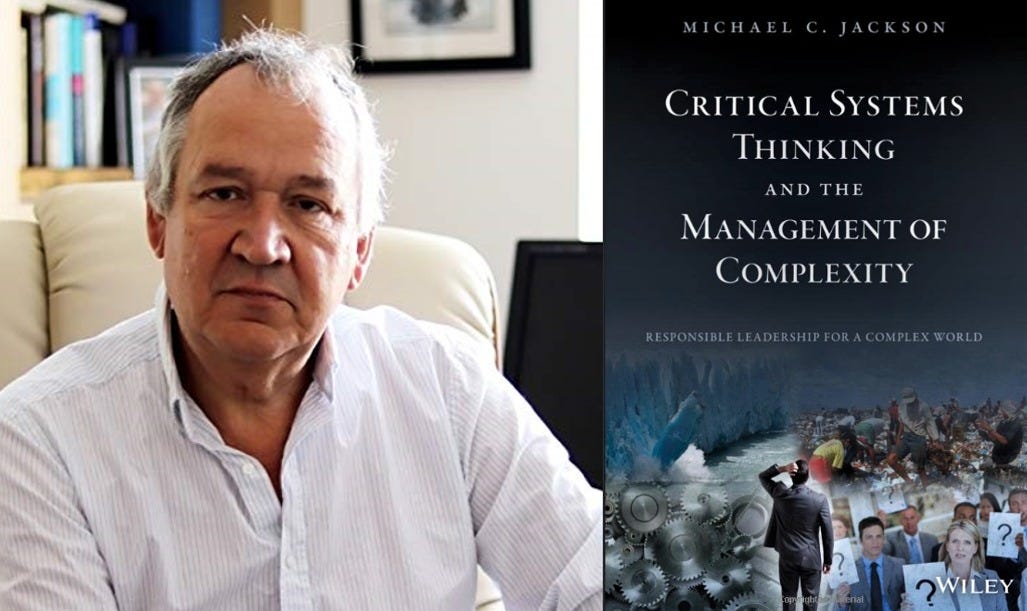Critical Systems Thinking and the Management of Complexity
An eight module online programme led by Professor Michael C Jackson OBE starting 21st February 2023
“There is a considerable debate about how to describe the modern world. Alternatives include the following: a global village, postindustrial society, consumer society, media society, network society, risk society, late capitalism, high modernity, postmodernity, liquid modernity, and the information age. To some, the new names just signal the rapid acceleration of changes in society that started to emerge between the sixteenth and eighteenth centuries. To others, we have crossed a threshold and entered a completely new era. What no one doubts is that things have become much more complex. We are entangled in complexity.” — Prof. Michael C Jackson OBE 1
I wanted to make you aware of a course I participated in last year, as applications are now being accepted for the next cohort. It’s called Introduction to Critical Systems Thinking and the Management of Complexity and starts on 21st February 2023. 2
An executive programme jointly developed by Dr Michael C Jackson OBE, author of Critical Systems Thinking and the Management of Complexity, and Paul Barnett, Founder of the Enlightened Enterprise Academy, the course is delivered online over eight weeks, featuring a combination of pre-recorded on-demand content and livestreamed dialogues recorded for future access.
I enjoyed participating in the first cohort of the course last year, in particular the dialogues between Mike and the invited guests, and would encourage anyone interested in broadening their understanding of systems thinking to take advantage of this opportunity.
As a guide through the complexities of systems thinking, Mike has a rare combination of in-depth knowledge across multiple different schools, direct real-world experience of application practice, and the deep personal humility that maximises learning.
My personal interest in systems thinking dates back to my schooldays and experiments with feedback systems in the physics laboratory. This had a major influence of my choice of degree — electronics engineering with a specific focus on the then emergent field of digital real-time control systems.
A few years after graduation, I moved to Cambridge to join one of the world’s leading open innovation labs as a digital systems engineer, then as a project manager, and then as leader of the Digital Systems Group.3
Over that time, my interests in systems thinking gravitated towards Purposeful Systems, and helping clients create the kind of organisational culture of innovation, agility, and adaptiveness we had at the lab.4
In 1995 our parent company acquired Innovation Associates, the consulting firm established by Peter Senge, Charles Kiefer, and Joel Yanowitz to help clients cultivate organisational learning. 5
Systems Thinking was the eponymous Fifth Discipline of Peter Senge’s book that Harvard Business Review called “one of the seminal management works of the previous 75 years”. 6
The Systems Thinking of Peter’s book title was in fact System Dynamics — one of the many schools of systems thinking Mike addresses in the course. Due to the success of Peter’s book, many people still mistake the latter for the former, and assume that systems thinking is all about mapping causal loop diagrams and identifying system dynamics archetypes. 7
The Introduction to Critical Systems Thinking and the Management of Complexity course explores multiple schools of systems thinking, highlighting their respective strengths and weaknesses in tackling various challenges we face in our increasingly complex and unpredictable world.
It aims to equip participants with foundational knowledge of a broad range of approaches for addressing the interrelated technical, structural, organisational, human, societal, and environmental issues that we face today and in the future.
Specifically, the course covers:
1 Introductory Session
The Development of Systems Thinking
The Nature of Complexity
‘Wicked Problems’
The Need for Systems Thinking
History of Systems Thinking
The Critical Systems Thinking Mindset
2. Critical Systems Thinking
Beyond Reductionism and Mechanistic Thinking
Holism
Pragmatism
A Multiperspectival and Multimethodological Approach
The Critical Systems Practice Skills-Set
3. The Mechanical Systems Approach
Systems Engineering
Deming
The Vanguard Method
Efficacy and Efficiency
4. The Organismic / Living Systems Approach
Organisations as Living Systems
Beer’s ‘Viable System Model’
Agility
Sustainability
Anti-Fragility
5. The Purposeful Systems Approach
Human Systems Are Different
Determining Purposes
Reaching Accommodations
Soft Systems Methodology
Avoiding ‘Groupthink’
Strategic Assumption Surfacing & testing
Red Team Thinking
6. The Societal / Environmental Systems Approach
Issues of Power Marginalisation
The Environment
Critical Systems Heuristics
Giving a Voice to Disadvantaged Groups
‘Representing’ the Environment and Future Generations
7. The Interrelationships Systems Approach
Causal Linkages in Systems
System Dynamics
Senge’s ‘Fifth Discipline’
Looking for Leverage Points
Avoiding Unintended Consequences
8. The Critical Systems Practice Cycle
Multiperspectival and Multimethodological Working
EPIC
Explore the Situation of Interest;
Produce an Intervention Strategy;
Intervene Flexibly;
Check and Evaluate
Special Offer
Paul has kindly offered members of my network a 20% discount on the course fee. I don’t get a commission, but you can get a great deal by clicking the button below:
Critical Systems Thinking and the Management of Complexity by Professor Michael C Jackson OBE (Wiley, 2019) Preface.
Find out more about the course here. Paul Barnett has kindly offered a 20% discount on the course fee for my subscribers at this link here (I don’t get commission, you just get a great deal 🙂).
Mike addresses Purposeful Systems in module 5 of the course as listed above.
Back then, Cambridge Consultants was a subsidiary of the management consulting firm Arthur D. Little which was the world leader in Technology and Innovation Management consulting.
Mike addresses System Dynamics in Chapter 11 of his book Critical Systems Thinking and the Management of Complexity (Ibid). You can find an introduction to some of the system dynamics archetypes online here.


